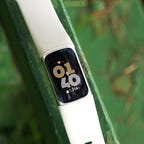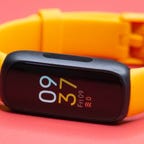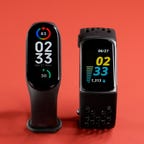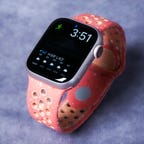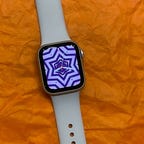 Why You Can Trust CNET
Why You Can Trust CNET Best Fitness Trackers for 2024
Try one of these fitness trackers to help you meet your exercise goals.
Fitness trackers are packed with features to help you keep up with step, exercise and movement goals whether it's a Fitbit, Apple or Garmin. They're also able to track your sleep patterns and some even let you know when you should be taking a rest day. So read on if you're looking for the best fitness tracker 2024 has to offer.
There are dozens of dedicated fitness tracker options to choose from that come in the form of wristbands, shoe insoles with activity-tracking features and smartwatches. We've rounded up our favorite trackers based on price, form and function. Each of them requires a mobile app to track your progress and some let you see phone notifications on your wrist.
Fitness tracking is great for keeping you motivated, but remember that not even the most advanced activity tracker will do the work for you. Still, no matter your health and fitness goals, any one of the activity trackers here will help you achieve peak performance. We'll be testing and updating this best fitness trackers list periodically.
If you're looking for more smart features and advanced fitness insights, make sure to check out our list of best smartwatches for 2023 with recommendations for the top Garmin, Apple Watch, Samsung Galaxy Watch and Polar wearables. Compared to a smartwatch, a fitness tracker is usually the best choice if you want to spend less than $200 and don't care about features like LTE connectivity, virtual assistants or third-party apps.
Read more: Best Budget Smartwatches Under $100
The Charge 6 is the best Fitbit you can get right now. With great health and fitness features including an electrocardiogram (ECG or EKG) app and excellent sleep tracking, it now connects to gym equipment and fitness apps so you can see your live heart rate data during a workout. The Charge 6 also connects to Google Maps from your phone for turn-by-turn navigation on your wrist and has closer integration with other Google apps like YouTube Music and Google Wallet.
The Charge 6 has a built-in GPS so you can track outdoor workouts without your phone, plus a blood oxygen sensor. The Daily Readiness Score can also tell you if your body is up to taking on a workout, or if you should take a rest day. But many of Fitbit's most useful features, like this score, are only available as part of Fitbit's $10-a-month Premium service. Without a Premium subscription, you can still use the Charge 6 for fitness and health tracking, it just won't give you the most in-depth metrics and trends over time. The battery should last you at least four to five full days, and it's compatible with iPhone and Android.
If you're looking for a fitness band that's discreet, affordable and has a long-lasting battery, consider the Fitbit Inspire 3. You won't get the built-in GPS or mobile payment options on the Charge 6, but it has health and fitness tracking essentials, including heart-rate monitoring, automatic workout detection and a detailed sleep analysis.
The battery can last as long as 10 days, so you won't need to charge it as often as other Fitbits. But beware that the screen is small, so it can be more difficult to read than other trackers and smartwatches.
For around $50, the Mi Band 7 is the best value fitness tracker on this list. It has a large color AMOLED touchscreen, 24/7 heart rate and sleep tracking. Battery life is also great, with about six days of use before needing to charge. The main downside is that heart-rate tracking for intense workouts does tend to be spotty and some features like contactless payments are not available in the US. There is a newer version of this model called the Mi Band 8, which we haven't fully reviewed yet.
Unlike some of the other devices on this list, the Apple Watch Series 9 is a true smartwatch. It has a temperature, blood oxygen and ECG sensor and comes in 41 and 45mm sizes. You can also choose a cellular or LTE model that lets you take calls and answer messages from your wrist without your phone, although that does cost extra. There are comprehensive tools for runners and cyclists on the Series 9 that give you in-depth looks at your running metrics. With WatchOS 10 you can also connect Bluetooth cycling accessories like power pedals to the watch.
The Series 9 also has the S9 chip that enables the Double Tap gesture so you can pinch your thumb and forefinger together to control the watch when you can't reach it with the other hand. Battery life generally lasts 18 hours with typical use, so you will need to charge this watch every day, unlike many of the other fitness trackers on this list.
The Series 9 may be a little more sophisticated, but the $249 Apple Watch SE has everything you need in a fitness tracker with added smartwatch features. Both watches share the same variety of exercise modes, sleep tracking, heart-rate monitoring, ability to detect irregular heart rhythms and cardio fitness notifications. There's also a redesigned new Compass app to help prevent you from getting lost on your next run. Apple's next software update, called WatchOS 10, brings extra features that cyclists and hikers will likely appreciate.
The Apple Watch SE is also compatible with dozens of fitness apps like Strava, Nike Training Club and Apple's own Fitness Plus. It lacks the Series 9's ability to take an ECG, measure wrist temperature and monitor blood oxygen. But for those who just need some extra motivation to close their Activity Rings, the Apple Watch SE has plenty to offer at a lower price than the Series 9.
These $300 smart insoles can turn any old running shoe into a high-tech tracker, giving you more fitness tracking information about your run than any wrist-based tracker we've ever tested. Each insole has 16 sensors that detect the pressure you're putting on your foot with every step you take. Together with the app and trackers, they can measure everything from step length to foot strike balance to give you real-time feedback on how to reduce injury or improve your time.
Garmin Lily
Best hybrid tracker for small wrists
If you're not quite ready to give up the look of a traditional wristwatch, but want something with smart features, consider the Garmin Lily. This is a tracker designed for smaller wrists and has a cool pattern etched in the background of the watch that gives it a unique look when the monochrome screen is on or off. Despite its tiny footprint, it doesn't skimp on all the important features you'd expect, including blood oxygen, sleep tracking and 24/7 heart-rate monitoring. Unlike some of the other trackers on this list, the Lily doesn't have any onboard storage for music, or built-in GPS.
The third-generation Oura Ring is a set-and-forget wearable. Wear it like a regular ring, and it will track your sleep, skin temperature, heart rate and blood oxygen levels in the background. Oura distills health metrics into easy-to-understand scores that put data into context, helping you understand whether you got a good night's sleep and are ready for a tough workout at a glance. Oura also updates the ring over time with new features, such as the newly launched chronotype metric, which should tell whether you're a morning person or night owl. But most of its features are locked behind a $6-per-month subscription, which can feel like a lot on top of its $300 price. Check out this story from CNET's Scott Stein, who spent six months wearing the Oura ring to learn more about it.




